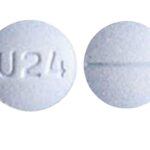Arkamin: Uses, Dosage, Side Effects, Addiction

Arkamin is a brand of clonidine which belongs to the group of medications called antihypertensives or vascular stabilizers. It is used alone or in combination with thiazide diuretics (e.g., hydrochlorothiazide) to treat high blood pressure. It is usually tried when other types of blood pressure medications are ineffective or cannot be used. This medication works by widening the blood vessels, which increases blood flow and lowers blood pressure.
Arkamin is also used in combination with other drugs to treat conditions like attention deficit hyperactivity disorder (ADHD), according to Medline Plus. Other uses for the drug include treatment for Tourette’s syndrome, anxiety issues, painful menstruation symptoms, and addiction-related withdrawal. Clonidine does have abuse potential. It is often abused in conjunction with other drugs, such as methadone, heroin, and prescription painkillers, according to Everyday Health.
How should I use Arkamin?
For treatment of high blood pressure, the usual starting dose of clonidine is 0.1 mg twice daily, taken in the morning and at bedtime. After 2 to 4 weeks, your doctor may increase your dose gradually by 0.1 mg per day. The usual dose ranges from 0.1 mg to 0.3 mg twice daily.
The tablets should be swallowed whole with water.
Do not stop taking this medication suddenly without checking with your doctor.
Many things can affect the dose of medication that a person needs, such as body weight, other medical conditions, and other medications. If your doctor has recommended a dose different from the ones listed here, do not change the way that you are taking the medication without consulting your doctor.
It is important to take this medication exactly as prescribed by your doctor. If you miss a dose, take it as soon as possible and continue with your regular schedule. If it is almost time for your next dose, skip the missed dose and continue with your regular dosing schedule. Do not take a double dose to make up for a missed one. If you are not sure what to do after missing a dose, contact your doctor or pharmacist for advice.
Who should NOT take Arkamin?
Do not take this medication if you:
• are allergic to clonidine or any ingredients of this medication
• have a certain type of abnormal heart rhythm associated with a low heart rate
What are the side effects of Arkamin?
The following side effects have been reported by at least 1% of people taking Arkamin. Many of these side effects can be managed, and some may go away on their own over time.
Contact your doctor if you experience these side effects and they are severe or bothersome. Your pharmacist may be able to advise you on managing side effects.
• decreased sexual ability
• constipation
• dizziness
• drowsiness
• dry mouth
• fatigue
• feeling unwell
• headache
• nausea and vomiting
• tiredness
• trouble sleeping
Although most of these side effects listed below don’t happen very often, they could lead to serious problems if you do not seek medical attention.
Check with your doctor as soon as possible if any of the following side effects occur:
• confusion
• difficulty changing visual focus
• difficulty urinating
• dizziness, lightheadedness, or fainting – especially when getting up from a lying or sitting position
• joint pain
• muscle pain or cramps
• paleness or cold feeling in fingertips and toes
• seeing or hearing things that are not there (hallucinations)
• signs of liver problems (e.g., nausea, vomiting, diarrhea, loss of appetite, weight loss, yellowing of the skin or whites of the eyes, dark urine, pale stools)
• skin rash
• slow, fast or pounding heart beat
• symptoms of blockage of the large bowel (e.g., constipation, vomiting, liver problems)
Stop taking the medication and seek immediate medical attention if any of the following occur:
• signs of a serious allergic reaction (e.g., hives; difficulty breathing; or swelling of the face, mouth, tongue, or throat)
Some people may experience side effects other than those listed. Check with your doctor if you notice any symptom that worries you while you are taking this medication.
Are there any other precautions or warnings for this medication?
Before you begin using a medication, be sure to inform your doctor of any medical conditions or allergies you may have, any medications you are taking, whether you are pregnant or breast-feeding, and any other significant facts about your health. These factors may affect how you should use this medication.
Depression: Arkamin can cause symptoms of depression. If you have a history of depression, discuss with your doctor how this medication may affect your medical condition, how your medical condition may affect the dosing and effectiveness of this medication, and whether any special monitoring is needed. If you experience symptoms of depression such as poor concentration, changes in weight, changes in sleep, or decreased interest in activities, or notice them in a family member who is taking this medication, contact your doctor as soon as possible.
Drowsiness/reduced alertness: Arkamin can cause drowsiness and dizziness and may affect the ability of your eyes to change focus quickly between distance and close up. Avoid driving, operating machinery, or performing other potentially hazardous tasks until you have determined how you are affected by this medication.
Eyes: This medication may affect the eye. People taking clonidine should receive periodic eye examinations. This medication can cause decreased tear production, and contact lenses may become uncomfortable to wear.
Heart or blood vessel disease: Arkamin lowers blood pressure, which can cause worsening of heart conditions that are affected by decreased blood flow. If you have severe heart or blood vessel disease, have recently had a heart attack or stroke, or a slow heart rate, discuss with your doctor how this medication may affect your medical condition, how your medical condition may affect the dosing and effectiveness of this medication, and whether any special monitoring is needed.
Kidney function: Kidney disease or decreased kidney function can cause this medication to build up in the body, causing side effects. If you have reduced kidney function, discuss with your doctor how this medication may affect your medical condition, how your medical condition may affect the dosing and effectiveness of this medication, and whether any special monitoring is needed.
Lactose: This medication may contain lactose. If you have galactose intolerance, the Lapp lactase deficiency, or glucose-galactose malabsorption, you should not take this medication without talking to your doctor.
Other medical conditions: If you have polyneuropathy or constipation, discuss with your doctor how this medication may affect your medical condition, how your medical condition may affect the dosing and effectiveness of this medication, and whether any special monitoring is needed.
Raynaud’s disease: If you have Raynaud’s disease, discuss with your doctor how this medication may affect your medical condition, how your medical condition may affect the dosing and effectiveness of this medication, and whether any special monitoring is needed.
Surgery: If you are having any type of surgery, make sure that the doctors involved in your care are aware that you are taking this medication.
Withdrawal: Don’t stop taking this medication without talking to your doctor. A severe withdrawal reaction may develop within 12 to 48 hours when clonidine is stopped suddenly. This reaction includes a rapid rise in blood pressure and symptoms such as nervousness, agitation, restlessness, pounding heartbeat, nausea, and headache. When stopping clonidine therapy, your doctor will instruct you to reduce the dose gradually over 2 to 4 days to avoid this reaction. A withdrawal reaction is most likely to occur in people who have been receiving large doses of clonidine or who are taking another type of blood pressure medication called a beta-blocker (e.g., atenolol, metoprolol, bisoprolol) at the same time.
Pregnancy: When taken during pregnancy, Arkamin crosses the placenta and may cause the developing baby’s heart rate to slow. Arkamin should not be used during pregnancy unless the benefits outweigh the risks. If you become pregnant while taking this medication, contact your doctor immediately.
Breast-feeding: Arkamin passes into breast milk. If you are a breast-feeding mother and are taking clonidine, it may affect your baby. Talk to your doctor about whether you should continue breast-feeding. Arkamin is not recommended for women who are breast-feeding.
Children: The safety and effectiveness of using this medication have not been established for children.
What other drugs could interact with this medication?
There may be an interaction between clonidine and any of the following:
• alcohol
• aldesleukin
• alpha-blockers (e.g., alfuzosin, doxazosin, tamsulosin)
• amifostine
• amiodarone
• amphetamines (e.g., dextroamphetamine, lisdexamphetamine)
• angiotensin converting enzyme inhibitors (ACEIs; captopril, enalapril, ramipril)
• angiotensin receptor blockers (ARBs; e.g., candesartan, irbesartan, losartan)
• antihistamines (e.g,. cetirizine, doxylamine, diphenhydramine, hydroxyzine, loratadine)
• antipsychotics (e.g., chlorpromazine, clozapine, haloperidol, olanzapine, quetiapine, risperidone)
• azelastine
• barbiturates (e.g., butalbital, pentobarbital, phenobarbital)
• benzodiazepines (e.g., alprazolam, diazepam, lorazepam)
• beta-adrenergic blockers (e.g., atenolol, metoprolol, propranolol, sotalol)
• brimonidine
• buprenorphine
• buspirone
• calcium channel blockers (e.g., diltiazem, verapamil)
• ceritinib
• chloral hydrate
• digoxin
• diuretics (water pills; e.g., aliskiren, furosemide, hydrochlorothiazide, triamterene)
• donepezil
• dronedarone
• efavirenz
• ephedrine
• epinephrine
• fingolimod
• galantamine
• general anesthetics (medications used to put people to sleep before surgery)
• guanfacine
• lanreotide
• levodopa
• methadone
• methylphenidate
• minocycline
• minoxidil
• mirtazapine
• muscle relaxants (e.g., baclofen, cyclobenzaprine, methocarbamol, orphenadrine)
• nabilone
• narcotic pain relievers (e.g., codeine, fentanyl, morphine, oxycodone)
• nitrates (e.g., nitroglycerin, isosorbide dinitrate, isosorbide mononitrate)
• nonsteroidal anti-inflammatory drugs (NSAIDs; e.g., indomethacin, naproxen, diclofenac)
• octreotide
• olopatadine
• other alpha agonists (e.g., methyldopa)
• pasireotide
• penoxifylline
• phosphodiesterase-5 inhibitors (e.g., sildenafil, tadalafil, vardenafil)
• pramipexole
• propafenone
• pseudoephedrine
• rituximab
• rivastigmine
• ropinirole
• rotigotine
• rufinamide
• scopolamine
• seizure medications (e.g., carbamazepine, clobazam, , levetiracetam, phenobarbital, phenytoin, primidone, topiramate, valproic acid, zonisamide)
• selective serotonin reuptake inhibitors (SSRIs; e.g., citalopram, duloxetine, fluoxetine, paroxetine, sertraline)
• serotonin/norepinephrine reuptake inhibitors (SNRIs; e.g., desvenlafaxine, duloxetine, venlafaxine)
• tapentadol
• tetrahydrocannabinol
• thalidomide
• tizanidine
• tramadol
• tricyclic antidepressants (e.g., clomipramine, desipramine, imipramine)
• zolpidem
• zopiclone
If you are taking any of these medications, speak with your doctor or pharmacist. Depending on your specific circumstances, your doctor may want you to:
• stop taking one of the medications,
• change one of the medications to another,
• change how you are taking one or both of the medications, or
• leave everything as is.
An interaction between two medications does not always mean that you must stop taking one of them. Speak to your doctor about how any drug interactions are being managed or should be managed.
Medications other than those listed above may interact with this medication. Tell your doctor or prescriber about all prescription, over-the-counter (non-prescription), and herbal medications that you are taking. Also tell them about any supplements you take. Since caffeine, alcohol, the nicotine from cigarettes, or street drugs can affect the action of many medications, you should let your prescriber know if you use them.





